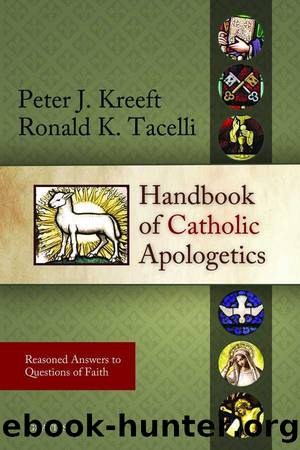Handbook of Catholic Apologetics: Reasoned Answers to Questions of Faith by Tacelli Fr. Ronald & Kreeft Peter

Author:Tacelli, Fr. Ronald & Kreeft, Peter [Tacelli, Fr. Ronald]
Language: eng
Format: epub
Publisher: Ignatius Press
Published: 2016-05-05T16:00:00+00:00
Basic Assumptions about the Human Person
Peeking out from behind our criticisms of the arguments against immortality were certain assumptions about what it means to be a human person. We think it important, before continuing our discussion of the soul, to be more explicit about them. We do not want to mislead anyone about the point of the positive arguments for immortality. Some might take them to imply that human beings are essentially immaterial souls or disembodied spirits. But while a good pagan may hold that view, a good (i.e., orthodox) Christian certainly cannot.
Christians believe that the human person is a mysterious unity of matter and spirit. There is a part of us that is extended in three dimensions and takes up space; this we call “matter”. But there is another facet of the unity we are that cannot be thought of in that way; this is the part of us we call “spirit”. Scripture says that God breathed life into lifeless matter, and that image of breath and life is most appropriate to the nature of spiritual being. The human spirit animates matter, gives it vital energy and gathers it into a living organic unity. That is what God created it to do. Thus Christians believe that a human spirit exists for a body; it was made to exist in matter as its life-giving principle. This means that all those parts of human life that seem most essentially spiritual, like knowing and choosing, also involve the body; the spirit experiences through the body. And so human life involves a most intimate relation between these two sides of our being: matter needs spirit to bind it into a functioning unity; spirit needs matter to release its potential for pursuing and enjoying all the goods, moral and intellectual, proper to a human life.
That is why Christians look forward to the resurrection of the body. It is part of their belief that the soul without the body is incomplete, that the full and complete person is present on the last day, when matter and spirit, transformed and redeemed, are joined together in the resurrection of the just.
Download
This site does not store any files on its server. We only index and link to content provided by other sites. Please contact the content providers to delete copyright contents if any and email us, we'll remove relevant links or contents immediately.
Christian Ethics by Wilkens Steve;(854)
Christian Ethics for a Digital Society by Kate Ott(778)
Fearfully and Wonderfully Made by Philip Yancey & Paul Brand(771)
God and the Multiverse by Victor J. Stenger(672)
Numbers by Ronald B. Allen(632)
How to Read Slowly by James W. Sire(613)
Christian Ethics: An Introduction to Biblical Moral Reasoning by Wayne Grudem(597)
The City of God by Saint Augustine & Marcus Dods(579)
Monastic Archaeology by Unknown(564)
Morality by Jonathan Sacks(564)
The Technological System by Jacques Ellul(543)
Amish Grace by Donald B. Kraybill & Nolt Steven M. & Weaver-Zercher David L(533)
Death of the Doctor by Unknown(525)
The Disabled Church by Rebecca F. Spurrier;(521)
Jesus: A New Vision by Whitley Strieber(519)
Children of Lucifer; The Origins of Modern Religious Satanism by Ruben van Luijk(507)
Critical Writings by Joyce James;(499)
Redeeming Sociology by Vern S. Poythress(485)
The Church in the Early Middle Ages by G.R. Evans(476)
